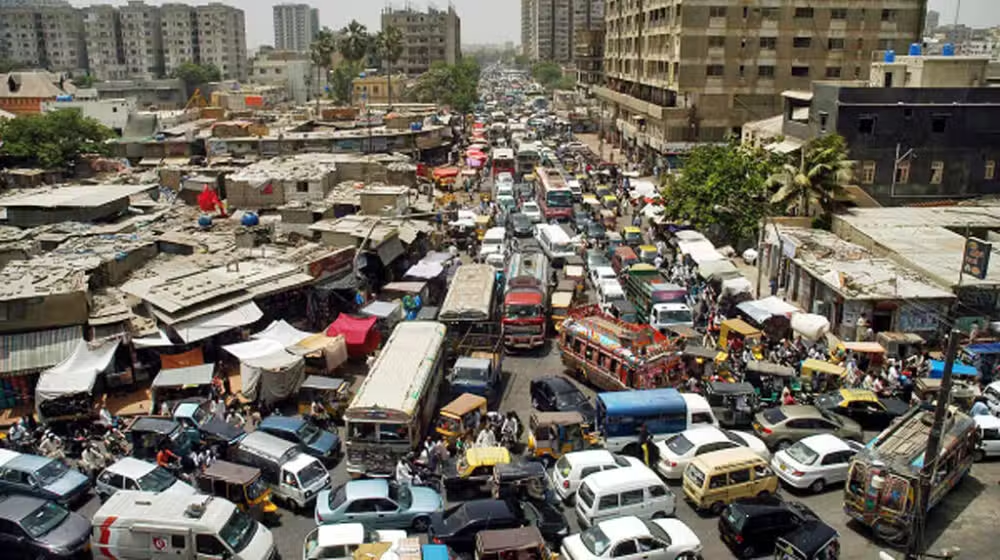ISLAMABAD, March 24: The United Nations Economic and Social Commission for Asia and the Pacific (UN-ESCAP) has released a report estimating that the urban population of the Asia-Pacific region will grow by 1.2 billion people by 2050.
This is part of an ongoing trend of urbanization, which has led to increased migration, especially climate-induced migration, in the region.
According to the UN study, if global temperatures rise by more than 1.5°C above pre-industrial levels, cities in the Asia-Pacific region will experience substantial influxes of climate migrants.
Karachi and Dhaka are predicted to be among the top 10 cities in the Global South to receive a combined total of eight million climate migrants by 2050.
Specifically, Dhaka is projected to receive 3.07 million additional migrants, while Karachi is expected to take in 2.4 million.
Urban Transformation
The findings were published in the “Urban Transformation in Asia and the Pacific: From Growth to Resilience” report, which is part of the agenda for the 81st annual session of UN-ESCAP scheduled to take place in Bangkok next month.
Read More: Weather Warning! Karachi Braces for Severe Heatwave
The report emphasizes the dual nature of urbanization, presenting both challenges and opportunities. Asia and the Pacific are home to a diverse range of human settlements, from sprawling megacities to ancient villages.
The region already hosts over 2.2 billion city dwellers, with some of the world’s largest and most populous cities. By 2050, the urban population in the region is expected to grow by 50%, adding 1.2 billion people to the cities.
Karachi The More Populated
However, cities like Karachi face significant challenges in urban management due to fragmented jurisdiction. Karachi, Pakistan’s largest city, suffers from poor governance, which complicates the delivery of essential services and infrastructure.
This is in contrast to better-managed cities such as Lahore, which are less susceptible to disasters like the devastating floods that affected Karachi in August 2020.
The report also highlights the issue of climate change and its effects on Asia-Pacific cities. Extreme weather events, including storms, floods, heatwaves, and droughts, are becoming more frequent and intense, exacerbating vulnerabilities such as water scarcity, food insecurity, and heat island effects in urban areas.
Also Read: Sindh Govt Unveils Online Portal to Address Karachi’s Problems
These cities are particularly vulnerable to the effects of climate change, including extreme temperatures and rising sea levels.
Urban growth in the region has put considerable pressure on water resources, leading to over-extraction of groundwater, especially in megacities like Bangkok, Jakarta, and Karachi.
This has contributed to land subsidence, further aggravating urban flooding and other challenges.
The report also discusses the importance of addressing carbon emissions from buildings, which are a major contributor to global warming.
The Asia-Pacific region is particularly challenged by this issue, as buildings account for between 14% and 33% of both direct and indirect carbon emissions in the area.
The decarbonization of the building sector remains a key challenge for sustainable development in the region.
In terms of economic challenges, remittances are a vital source of income for many countries in Asia and the Pacific.
Regional Nations
In 2023, countries like India, China, the Philippines, and Pakistan were among the top recipients of remittances, which help support families and economies in the region.
However, the region also faces significant socio-economic challenges, including the high prevalence of informal settlements.
Almost 43% of the urban population in South and South-West Asia and 25% in South-East Asia live in informal settlements, which often lack access to basic services like water and sanitation.
To address these challenges, the report recommends that governments in the region enhance regional cooperation and develop collaborative urban networks.
Also Read: Karachi Weather Alert: Temperature to Drop Significantly This Week
Such networks can facilitate the sharing of knowledge and best practices among cities, enabling them to take collective action to address climate and socio-economic vulnerabilities.
The report stresses the importance of these efforts in achieving the Sustainable Development Goals and meeting the objectives of the Paris Agreement on climate change.
In summary, the report highlights the growing urban population in the Asia-Pacific region, the challenges posed by climate change and rapid urbanization, and the need for enhanced cooperation among governments to ensure that cities can effectively respond to environmental and socio-economic vulnerabilities.









